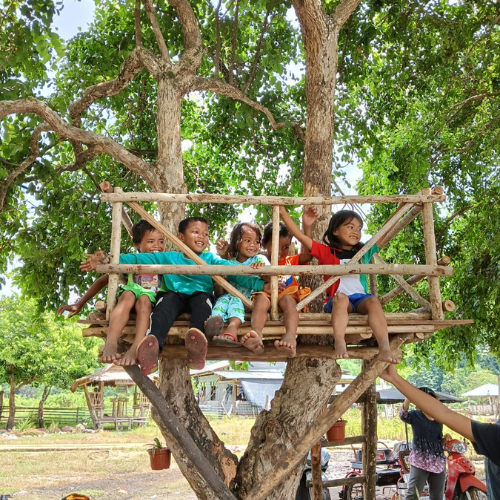Play Labs
Play is one of the most important ways children experience and make sense of the world around them. It sets the foundation for the development of critical social and emotional skills. Emerging evidence suggests that integrating play into caregiving and learning can help children grow into adaptive and resilient adults who are able to better navigate challenges in life.
Quantedge Advancement Initiative, in partnership with UBS Optimus Foundation, is supporting BRAC International to pilot its Play Lab model in the Philippines. This pilot project will be carried out with the local government to support the implementation of play-based early learning approaches in the education system.
BRAC’s Play Lab model is developed based on global best practices and evidence on play-based early learning, to promote the holistic development of children ages 3 to 5. The contextualised Play Lab model combines sustainable and safe play spaces with low-cost play materials, a gender-transformative play-based learning curriculum, and joyful Play Leaders to create a child-friendly environment. It fosters the development of their language, motor, cognitive, social-emotional, and self regulation skills.
The Play Lab model also emphasises community engagement and female empowerment:
Quantedge Advancement Initiative, in partnership with UBS Optimus Foundation, is supporting BRAC International to pilot its Play Lab model in the Philippines. This pilot project will be carried out with the local government to support the implementation of play-based early learning approaches in the education system.
BRAC’s Play Lab model is developed based on global best practices and evidence on play-based early learning, to promote the holistic development of children ages 3 to 5. The contextualised Play Lab model combines sustainable and safe play spaces with low-cost play materials, a gender-transformative play-based learning curriculum, and joyful Play Leaders to create a child-friendly environment. It fosters the development of their language, motor, cognitive, social-emotional, and self regulation skills.
The Play Lab model also emphasises community engagement and female empowerment:
- The Play Lab curriculum is co-developed with local communities to ensure that it is contextualised and culturally relevant.
- Caregivers and community members are included in the Play Lab activities to sensitise them to the importance of learning through play.
- Local young women are recruited and trained as Play Leaders to facilitate the Play Lab curriculum. This creates new career pathways for young women while building the local early childhood development workforce.
- The Play Lab parents receive parenting education focusing on child development and parent’s wellbeing to enhance parents’ knowledge, attitude and practice on child rearing.
BRAC’s Play Labs in Bangladesh, Tanzania, and Uganda have been providing local communities with access to high-quality early learning services. Our support for the Play Lab pilot in the Philippines will help to leverage BRAC’s expertise and the power of play to transform early learning for rural communities in the long term.
Find out more:
Find out more:


